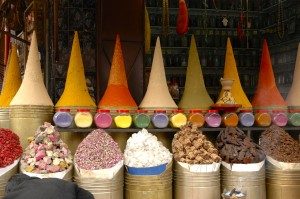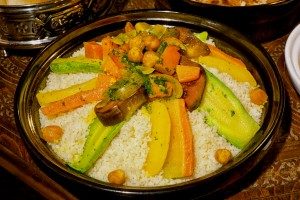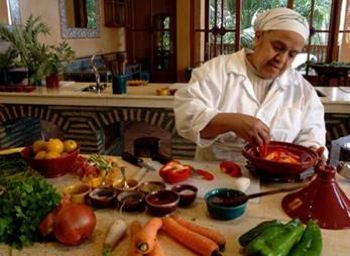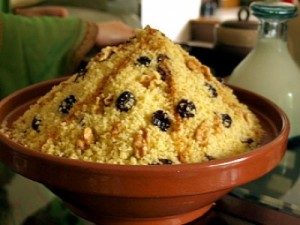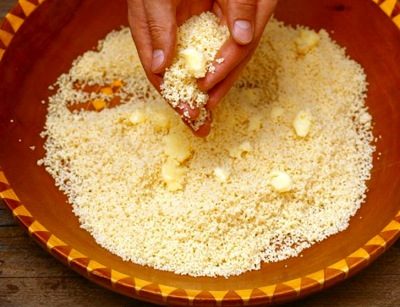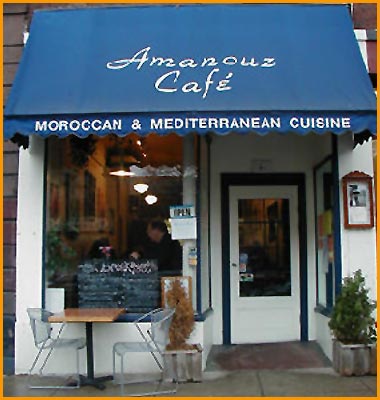The great sea voyages of the Portuguese explorers Ferdinand Magellan, who served for a while in Morocco, Vasco de Gama and the Spanish captain Christopher Columbus expanded trade routes around the world and especially the spice trade and the security of these routes was crucial. Morocco was on the route between Europe, the Middle East and Asia and therefore acquired a number of spices as Portuguese and Spanish enclaves and ports were established along the Moroccan coast.
Tag: Couscous
Morocco has an exceptional history of cuisine with long standing reputation and allure for the Western traveler. Being at the crossroads of many civilizations Morocco is a mélange of Arab, Berber, Moorish, French, Middle Eastern, Mediterranean African, Iberian, and Jewish influences. Keeping up to date with new travel trends, Travel Exploration has launched a Culinary Trip to Morocco for food enthusiasts. Morocco is a key destination for foodies, adventure travelers and those who wish to explore an untouched country that is full of culinary surprise and old world culture.
When considering a Morocco Tour there are many options which will make for a unique travel experience. One way for Moroccan travelers to discover the real Morocco is through a Morocco Cooking Vacation. There are various types of Morocco Cooking vacations. Some are offered as culinary tours to Morocco with a focus on creating and making various traditional Moroccan recipes daily. A Taste of Morocco Tour offers the opportunity to discover Moroccan cuisine through cooking workshops in Marrakech, Fes and Essaouira. Morocco Just For Women on the other hand offers group lessons with other women who have come to Morocco specifically to explore the country’s culture through a womans’ eyes which includ cooking workshops.
Moroccan food is considered some of the best in the world. The easiest way to discover the true flavors of Moroccan cuisine are to take a Moroccan cooking class or explore various restaurants in Morocco’s Imperial Cities such as Marrakech, Fes, Rabat or Essaouira on a Morocco tour. Another way to discover authentic Moroccan cuisine is to dine with a local family in a Berber Village. Berber villages are known for their unique fare as result that their main staples in making Moroccan traditional cuisine such as couscous are grown locally in their fields alongside special herbs which allows for amazingly tasteful food. Moroccan recipes such as baking bread by fire and a tajine on starlit night can be learning on a Sahara desert tour to the Erg Chebbi Dunes of Merzouga whereby your camel trekking guide takes you off on a journey into the vast dunes to a Sahara camp at sunset to learn the secrets of the Sahara. To fully enjoy a Moroccan meal one must arrive with an empty stomach and then fully prepare themselves for a three or four-course Moroccan feast. As the French proverb says, “Appetite comes with eating; the more one has, the more one would have” so make sure to visit Morocco with an open palate and a big appetite!
If you’re planning a Morocco vacation one of the best ways to discover the culture of the Maghreb is to taking a cooking class or a private, cooking course in Morocco’s Imperial Cities of Marrakech and Fes or consider a Moroccan culinary tour. Marrakech and Fes offer some of the Morocco’s best cooking classes as a result of their subculture and history of fine cuisine alongside being able to lay claim to some of the best restaurants in Morocco.
Moroccan cuisine is the culinary star of North Africa. Imperial and trade influence has been filtered and blended into Morocco’s culture. Being at the crossroads of many civilizations, the cuisine of Morocco is a mélange of Arab, Berber, Moorish, French, Middle Eastern, Mediterranean African, Iberian, and Jewish influences. Moroccan cooking is enhanced with fruits, dried and fresh — apricots, dates, figs, and raisins, to name a few. Lemons preserved in a salt-lemon juice mixture bring a unique face to many Moroccan chicken and pigeon dishes. Nuts are prominent; pine nuts, almonds, and pistachios show up in all sorts of unexpected places.
After reading all about the traditional cuisine and sweet mint tea of Morocco I was…

